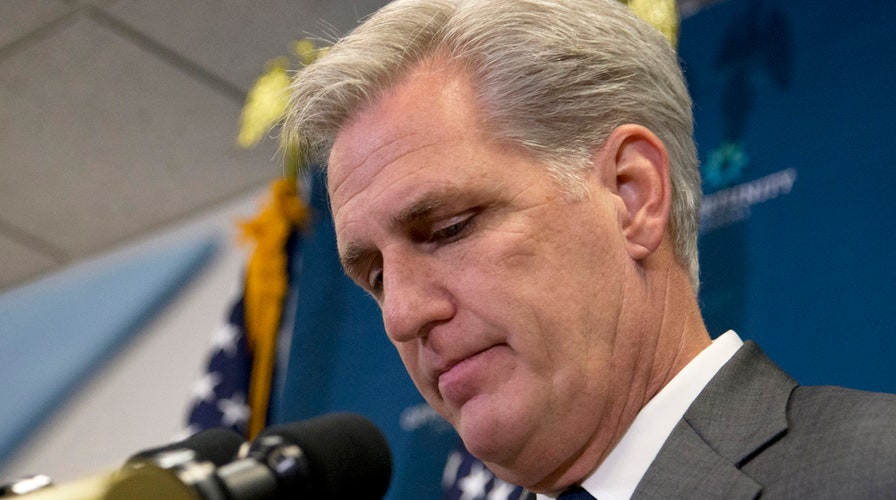Kevin McCarthy drops out of race for House speaker
Speaker election postponed; Reaction on 'Outnumbered'
House Majority Leader Kevin McCarthy, who was considered the front-runner to replace John Boehner, stunned his Republican colleagues Thursday by abruptly withdrawing from the race, throwing the leadership battle into chaos.
McCarthy's decision, announced moments before Republicans were set to nominate their candidate, will postpone the vote for speaker. McCarthy had been running against Reps. Jason Chaffetz, R-Utah, and Daniel Webster, R-Fla., before he dropped out, and it's unclear whether other candidates will now step forward.
While McCarthy, R-Calif., faced vocal opposition from some conservative members and groups, he was thought to have more than enough support to win the party's nomination in the vote initially set for Thursday. Fox News is told McCarthy, in revealing his choice, simply told colleagues it was not his time.
His withdrawal rattled fellow lawmakers, particularly allies in leadership. But addressing reporters afterward, McCarthy said he thinks the party needs a "fresh face."
"If we are going to unite and be strong, we need a new face to help do that," McCarthy said. "We've got to be 100 percent united."
He said he will stay on as majority leader.
Chaffetz, speaking shortly afterward, said McCarthy's withdrawal was "absolutely stunning." Chaffetz said he would remain in the race. "I really do believe it is time for a fresh start," he said.
While Boehner originally was set to resign at the end of the month, the speaker said in a statement Thursday afternoon he "will serve as Speaker until the House votes to elect a new Speaker." He added, "I'm confident we will elect a new Speaker in the coming weeks."
Practically speaking, Republicans' overriding interest is to find a candidate who can muster an absolute majority on the House floor in a full chamber vote, originally set for Oct. 29. While McCarthy was likely to easily win the nomination, it was unclear whether he could muster a majority -- of roughly 218 members -- once lawmakers from both parties vote for speaker.
McCarthy gave no indication of dropping out earlier in the day. "It's going to go great," McCarthy said Thursday morning. But he later suggested he was concerned he'd only be able to win narrowly in a floor vote.
Rep. Darrell Issa, R-Calif., said McCarthy actually felt he couldn't reach 218. Still, he said McCarthy's backing will be the "most important endorsement" for whoever seeks the post.
Rep. Paul Ryan, R-Wis., the party's vice presidential nominee in 2012, swiftly put out a statement saying he would not run, while saying he's "disappointed" McCarthy dropped out.
Conservative groups, meanwhile, cheered the decision. FreedomWorks CEO Adam Brandon said in a statement that McCarthy "dropped out of the Speaker race because of the House Freedom Caucus and grassroots pressure. ... This is a huge win for conservatives who want to see real change in Washington, not the same go along get along ways of Washington."
He was referring in part to a decision Wednesday by the conservative House Freedom Caucus -- with its 30-40 members -- to back Webster as a bloc.
The speaker's race already has seen several curveballs since Boehner suddenly announced his retirement and McCarthy swiftly positioned himself as the presumptive next in line.
Shortly after announcing his candidacy, McCarthy was seen to stumble in a Fox News interview where he appeared to link Hillary Clinton's dropping poll numbers to the congressional Benghazi committee. His comments fueled Democratic charges that the committee is merely political, which GOP leaders deny.
Amid the backlash over McCarthy's Benghazi remarks, Chaffetz entered the leadership race over the weekend.
Republicans have nearly 250 members in the House and on paper have the numbers to win against the Democrats' nominee, likely Nancy Pelosi. But if the eventual Republican nominee comes out with a tally short of 218, he or she will have to try to rally support to get to that number.
In a curious development, Rep. Walter Jones, R-N.C., also sent a letter to House Republican Conference Chairwoman Cathy McMorris Rodgers, R-Wash., urging a full vetting of all leadership candidates to avoid a repeat of 1998, when the conference selected then-Rep. Bob Livingston in November to succeed outgoing House Speaker Newt Gingrich. It then emerged Livingston had been conducting an affair. Jones asked that any candidate who has committed "misdeeds" withdraw.
Asked by FoxNews.com to elaborate, Jones said he doesn't "know anything" specific about any of the candidates, but, "We need to be able to say without reservation that 'I have nothing in my background that six months from now could be exposed to the detriment of the House of Representatives.'" He said he wants to make sure the candidates have "no skeletons."
Fox News' Chad Pergram and FoxNews.com's Cody Derespina and The Associated Press contributed to this report.

























